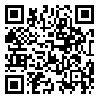BibTeX | RIS | EndNote | Medlars | ProCite | Reference Manager | RefWorks
Send citation to:
URL: http://jdisabilstud.org/article-1-766-en.html
2- Babol Islamic Azad University
Background & Objective: Specific learning disability is among the most destructive issues for the educational system. Every year many students with a diagnosis of specific learning disability being diagnosed. They have many problems in learning the lessons because of their failings to understand some special academic materials. Despite the normal emotional quotient, those students who are afflicted by this phenomenon that they do not have the expectable academic performance. They also have many problems in another aspect of the life. One of the factors, which play an important role in the emergence, and continuation of the specific learning disability is perceptual disabilities, especially inability in perceptual motor activities. However, the most debilitating factor is a failure in information processing (i.e. attention, perception, memory and language), which leaves irreparable effects on learning disabled students’ thinking, listening, and learning. Hence, paying attention to learning disabled students’ perceptual–motor skills is of paramount importance. Thus, the purpose of the current research was to study on effect of perceptual–motor skills training on the academic performance of students with specific learning disability.
Methods: The design of the current study was a quasi–experimental type in nature. The population consisted of all the 217 male and female elementary school students who were diagnosed as specific learning disabled in Sari city (Mazandaran province, North of Iran) during the academic year of 2012–2013. Using a simple random sampling method, 50 students were chosen and divided into control and experimental groups with 25 members in each group. The research tools were included of Ravens’ IQ test and a teacher–made test. Both tools have needful psychometric criteria. At the beginning of the study, both of groups took part in the pre–test, then experiment group members received a period of perceptual–motor skills training while the control group was left without any intervention (they were continuing the traditional education system), and at last, both groups took part in the posttest. After collecting the raw data, both descriptive and inferential statistics were used for data analyzing. In order to test the hypotheses of the research, the analysis of covariance (MANCOVA), as a parametric test was used by using the SPSS version 18 software.
Results: After analyzing the data, the results showed that the perceptual motor skills training had a significant effect on the improving reading (p≤0.001), writing (p≤0.001) and mathematical (p≤0.001) skills of the students with specific learning disability.
Conclusion: Providing perceptual–motor skills for students who afflicted by the specific learning disability could lead to an improvement in students’ academic performance generally and their reading, writing and mathematics skills specifically. Although the effectiveness of perceptual–motor skills for students with a specific learning disability could be related to many factors, but it appears that its major effects arise from the positive affect of the treatment on the attention, concentration and other executive functions, which they affect the reading, writing and mathematics skills of the students directly. Therefore, considering the results of this study, the treatment can be suggested to all the experts in the field of specific learning disability disorder.
| Rights and permissions | |
 |
This work is licensed under a Creative Commons Attribution-NonCommercial 4.0 International License. |




